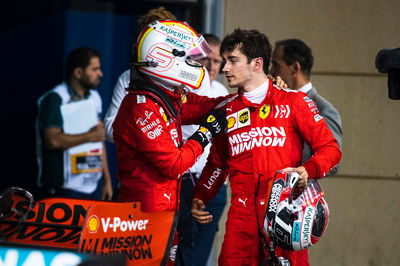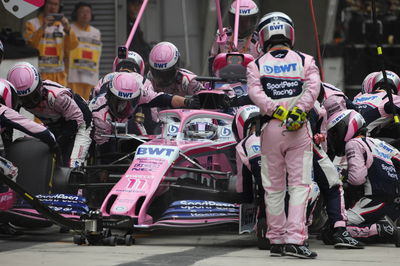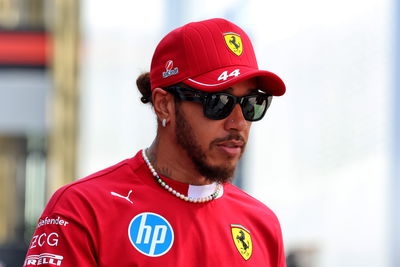The self-inflicted dilemma facing Ferrari
After seemingly being opposed to using team orders last season, Ferrari has dramatically flipped its philosophy around which is already playing a pivotal role in its Formula 1 world title charge in 2019.
The Italian outfit has imposed team orders on its drivers at each of the opening three rounds of the campaign. First, it instructed the faster Charles Leclerc to stay behind teammate Sebastian Vettel at the season-opener in Australia, and the new recruit duly obliged.
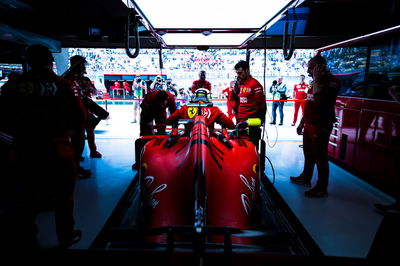
After seemingly being opposed to using team orders last season, Ferrari has dramatically flipped its philosophy around which is already playing a pivotal role in its Formula 1 world title charge in 2019.
The Italian outfit has imposed team orders on its drivers at each of the opening three rounds of the campaign. First, it instructed the faster Charles Leclerc to stay behind teammate Sebastian Vettel at the season-opener in Australia, and the new recruit duly obliged.
It was a different story in Bahrain, however, as Leclerc ignored calls to hold position behind Vettel for two laps as he immediately passed the German to take a lead he would not relinquish until late engine issues robbed him of what would have been a dominant first win.
Fast-forward two weeks to China and Leclerc, angry at himself for fractionally losing out to Vettel in qualifying, stuck the nose of his Ferrari up the inside of Vettel to snatch third place at Turn 1 on the opening lap.
Having its drivers squabble for position while the Mercedes pair scampered off into the distance was not part of Ferrari’s game plan heading into the race, and it quickly called off the fight with Vettel shadowing his younger teammate during the early stages.
On Lap 10 the call came, with Ferrari instructing Leclerc to allow Vettel through back into third after the Monegasque had been unable to keep tabs with Lewis Hamilton and Valtteri Bottas.
The switch, an attempt to put pressure on Mercedes, would have paid off had Vettel been able to pull clear and make inroads on the leaders, but that was not how things panned out. Instead, it provided Ferrari with a headache.
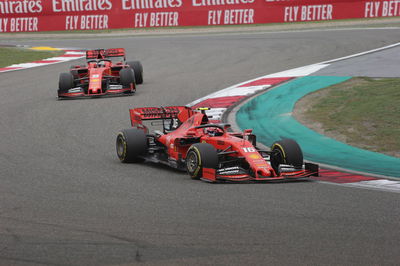
Leclerc was just under four seconds behind Bottas when he was told to let Vettel through. With Vettel now leading Ferrari’s charge, the gap increased to nearly five seconds as he failed to reel in Bottas and made small errors - snatching his brakes on more than one occasion - in the process.
By this stage, Leclerc, already riled by Ferrari’s decision, was quick to remind his team that he was the one now losing time.
“We are discussing it,” came the reply from his engineer.
Ferrari allowed the situation to remain the status quo and both its cars drifted further and further behind.
Meanwhile, Max Verstappen was beginning to catch the Ferrari pair and Red Bull sensed an opportunity, rolling the dice on an undercut strategy in an attempt to get ahead of the red cars. The gamble worked, as Verstappen successfully got the jump on Leclerc, after Ferrari had reacted by extending Leclerc’s remaining stints longer than originally planned.
It resulted in Leclerc losing out on fourth place as he slipped to fifth, with the 21-year-old acting as something of a roadblock to hold up Bottas later on in the race as Ferrari tried a last-ditch bid to close the gap with Vettel. Vettel ultimately came home a distant third, with Verstappen splitting the Ferraris in fourth.
Heading into the Chinese GP weekend, team principal Mattia Binotto had reiterated the Scuderia’s stance on its team orders policy, insisting that Vettel would be given priority in any “50-50” situations in order to avoid a repeat of the pitfalls of last season - such as in Monza, where Ferrari managed to throw away a front-row lock out after refusing to back one driver over the other on the run to Turn 1, as Hamilton and Mercedes capitalised.
Ferrari’s early reasoning for backing Vettel, citing his greater experience as a four-time world champion, was understandable, but he has so far been unable to plant his marker down in the team despite finding increased support from within, something he was missing in 2018.
Ferrari only needs to look at its chief rival Mercedes to see how team orders can be managed successfully. The reigning world champions has fervently been against the idea of using team orders and allowed Hamilton and Nico Rosberg to fight freely during its dominant early days of the V6 hybrid era, before increased competition from Ferrari in the last two years forced the German manufacturer to rethink its policy.
In 2018 it allowed Hamilton and Bottas to battle it out until a point where one driver no longer had a realistic shot of winning the title. It called off a fight while holding a one-two in the closing laps of a chaotic rain-hit race on home soil in Germany but team orders did not resurface again until the Russian Grand Prix, where race-leader Bottas (at that stage over 100 points down on Hamilton in the championship) was forced to concede a deserved victory to aid his teammate’s title bid. A harsh call, but one that made sense all things considered.
Asked about Ferrari’s use of team orders, Mercedes boss Toto Wolff said: “That's a tricky situation because you would like the quicker car hunting down your opponents and Sebastian said he had the quicker car at that stage and they reverted the order. I can understand that.
"Nevertheless, when you start doing these things it becomes very complicated and you start a precedent and open a can of worms.
“Then you might have to call at every race that the car behind can go quicker. So, it's not an easy situation and we have been there with Nico and Lewis and with Valtteri too."
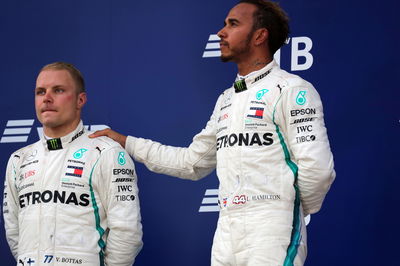
Ferrari already ruing missed opportunities
Missed opportunities and poor judgement calls were a theme of the team’s title capitulation last season, and Ferrari was determined to avoid the same kind of mistakes heading into 2019, having re-organised its team structure with the appointment of Binotto in place of the axed Maurizio Arrivabene.
While Ferrari’s actions in Shanghai did not come as surprise, it effectively shot itself in the foot by squandering points to Mercedes in failing to secure what should have been a comfortable three-four finish.
And could there be more repercussions to come further down the line?
Ferrari, desperate to win its first championship title since 2008, has so far thrown its weight behind Vettel, a decision that risks alienating Leclerc, who was clearly frustrated by the events that occurred in China.
“We tried everything we could not to lose time on the Mercedes ahead, and that was the only chance that we got at the time,” Binotto explained after the race.
“We tried - it didn’t work, let’s say, but it seemed it was right to give that chance to Seb. I think as a team, we did whatever we could.
“Certainly it’s difficult as a team to give the order, because we understand the drivers, they need to battle to stay ahead as much as they can. So it was certainly not an easy decision.
“I have to thanks Charles, I think the way he behaved, again he’s showing he’s a good team player, but I think again there will be a time when the situation is reverted. I think as a team, we need always to maximise the team points. In that respect again, I think we did the right choice."
Since arriving at Ferrari following his winter graduation from Sauber, Leclerc has proven to be a match for Vettel. Just one point separates the Ferrari duo in Vettel’s favour, but arguably Leclerc could, and perhaps should, be ahead.
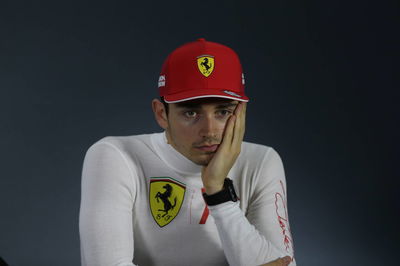
The current 31-point deficit splitting Vettel to Hamilton could easily have been reduced down to 25 had Leclerc been allowed to pass Vettel for fourth in Melbourne and gone on to finish third instead of Vettel in China.
Ferrari’s decision-making has cost Leclerc a theoretical seven points which could be crucial come the end of the season. They are points which now cannot be recovered.
Similar calls in the coming races could see Ferrari throw away more points it cannot afford to lose given it already finds itself 57 adrift of Mercedes in the constructors’ championship.
While Leclerc accepted Ferrari’s post-race explanation, he has clearly shown he is not willing to play the subservient role carried out by the likes of Kimi Raikkonen (and others that have gone before him) so willingly. Leclerc has been talked of as Ferrari’s future, but he is keen to be its present.
A case can be made for Leclerc emerging as Ferrari’s more consistent driver from the opening three races, with Vettel seemingly unable to shake off past errors - highlighted by his fourth spin in ten races in Bahrain.
Back in January this writer argued that Leclerc’s arrival at Ferrari would either make or break Vettel’s tenure at Maranello, and judging by the early signs at least, it appears to be swinging towards the latter.
Taking a step back, it is worth noting that we are only at round three of 21 and there is still an awful lot of racing still yet to complete.
The championship picture remains as unclear as it did before a wheel was turned in 2019, with the pendulum of performance dramatically swinging back and forth between Mercedes and Ferrari. Plenty of time remains for Ferrari to turn things around.
It is by no means facing a crisis just yet, but if Ferrari does not handle its approach to its self-inflicted driver dilemma carefully, it risks early friction developing into something much more harmful.
